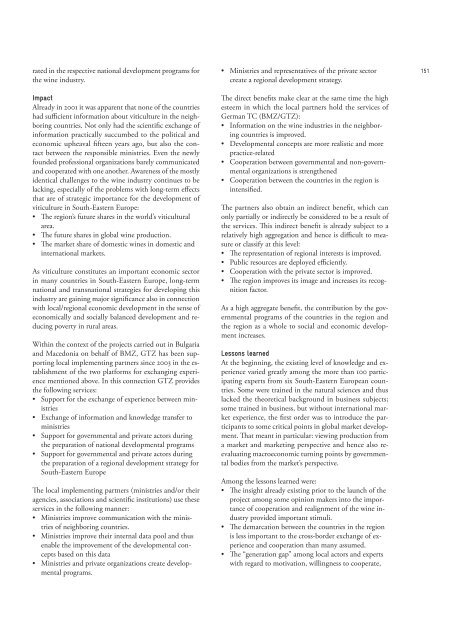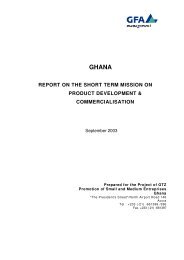Local/Regional Economic Development in South ... - Value Chains
Local/Regional Economic Development in South ... - Value Chains
Local/Regional Economic Development in South ... - Value Chains
Create successful ePaper yourself
Turn your PDF publications into a flip-book with our unique Google optimized e-Paper software.
ated <strong>in</strong> the respective national development programs for<br />
the w<strong>in</strong>e <strong>in</strong>dustry.<br />
Impact<br />
Already <strong>in</strong> 2001 it was apparent that none of the countries<br />
had sufficient <strong>in</strong>formation about viticulture <strong>in</strong> the neighbor<strong>in</strong>g<br />
countries. Not only had the scientific exchange of<br />
<strong>in</strong>formation practically succumbed to the political and<br />
economic upheaval fifteen years ago, but also the contact<br />
between the responsible m<strong>in</strong>istries. Even the newly<br />
founded professional organizations barely communicated<br />
and cooperated with one another. Awareness of the mostly<br />
identical challenges to the w<strong>in</strong>e <strong>in</strong>dustry cont<strong>in</strong>ues to be<br />
lack<strong>in</strong>g, especially of the problems with long-term effects<br />
that are of strategic importance for the development of<br />
viticulture <strong>in</strong> <strong>South</strong>-Eastern Europe:<br />
• The region’s future shares <strong>in</strong> the world’s viticultural<br />
area.<br />
• The future shares <strong>in</strong> global w<strong>in</strong>e production.<br />
• The market share of domestic w<strong>in</strong>es <strong>in</strong> domestic and<br />
<strong>in</strong>ternational markets.<br />
As viticulture constitutes an important economic sector<br />
<strong>in</strong> many countries <strong>in</strong> <strong>South</strong>-Eastern Europe, long-term<br />
national and transnational strategies for develop<strong>in</strong>g this<br />
<strong>in</strong>dustry are ga<strong>in</strong><strong>in</strong>g major significance also <strong>in</strong> connection<br />
with local/regional economic development <strong>in</strong> the sense of<br />
economically and socially balanced development and reduc<strong>in</strong>g<br />
poverty <strong>in</strong> rural areas.<br />
With<strong>in</strong> the context of the projects carried out <strong>in</strong> Bulgaria<br />
and Macedonia on behalf of BMZ, GTZ has been support<strong>in</strong>g<br />
local implement<strong>in</strong>g partners s<strong>in</strong>ce 2003 <strong>in</strong> the establishment<br />
of the two platforms for exchang<strong>in</strong>g experience<br />
mentioned above. In this connection GTZ provides<br />
the follow<strong>in</strong>g services:<br />
• Support for the exchange of experience between m<strong>in</strong>istries<br />
• Exchange of <strong>in</strong>formation and knowledge transfer to<br />
m<strong>in</strong>istries<br />
• Support for governmental and private actors dur<strong>in</strong>g<br />
the preparation of national developmental programs<br />
• Support for governmental and private actors dur<strong>in</strong>g<br />
the preparation of a regional development strategy for<br />
<strong>South</strong>-Eastern Europe<br />
The local implement<strong>in</strong>g partners (m<strong>in</strong>istries and/or their<br />
agencies, associations and scientific <strong>in</strong>stitutions) use these<br />
services <strong>in</strong> the follow<strong>in</strong>g manner:<br />
• M<strong>in</strong>istries improve communication with the m<strong>in</strong>istries<br />
of neighbor<strong>in</strong>g countries.<br />
• M<strong>in</strong>istries improve their <strong>in</strong>ternal data pool and thus<br />
enable the improvement of the developmental concepts<br />
based on this data<br />
• M<strong>in</strong>istries and private organizations create developmental<br />
programs.<br />
•<br />
M<strong>in</strong>istries and representatives of the private sector<br />
create a regional development strategy.<br />
The direct benefits make clear at the same time the high<br />
esteem <strong>in</strong> which the local partners hold the services of<br />
German TC (BMZ/GTZ):<br />
• Information on the w<strong>in</strong>e <strong>in</strong>dustries <strong>in</strong> the neighbor<strong>in</strong>g<br />
countries is improved.<br />
• <strong>Development</strong>al concepts are more realistic and more<br />
practice-related<br />
• Cooperation between governmental and non-governmental<br />
organizations is strengthened<br />
• Cooperation between the countries <strong>in</strong> the region is<br />
<strong>in</strong>tensified.<br />
The partners also obta<strong>in</strong> an <strong>in</strong>direct benefit, which can<br />
only partially or <strong>in</strong>directly be considered to be a result of<br />
the services. This <strong>in</strong>direct benefit is already subject to a<br />
relatively high aggregation and hence is difficult to mea-<br />
sure or classify at this level:<br />
•<br />
•<br />
•<br />
•<br />
The representation of regional <strong>in</strong>terests is improved.<br />
Public resources are deployed efficiently.<br />
Cooperation with the private sector is improved.<br />
The region improves its image and <strong>in</strong>creases its recognition<br />
factor.<br />
As a high aggregate benefit, the contribution by the governmental<br />
programs of the countries <strong>in</strong> the region and<br />
the region as a whole to social and economic development<br />
<strong>in</strong>creases.<br />
Lessons learned<br />
At the beg<strong>in</strong>n<strong>in</strong>g, the exist<strong>in</strong>g level of knowledge and experience<br />
varied greatly among the more than 100 participat<strong>in</strong>g<br />
experts from six <strong>South</strong>-Eastern European countries.<br />
Some were tra<strong>in</strong>ed <strong>in</strong> the natural sciences and thus<br />
lacked the theoretical background <strong>in</strong> bus<strong>in</strong>ess subjects;<br />
some tra<strong>in</strong>ed <strong>in</strong> bus<strong>in</strong>ess, but without <strong>in</strong>ternational market<br />
experience, the first order was to <strong>in</strong>troduce the participants<br />
to some critical po<strong>in</strong>ts <strong>in</strong> global market development.<br />
That meant <strong>in</strong> particular: view<strong>in</strong>g production from<br />
a market and market<strong>in</strong>g perspective and hence also reevaluat<strong>in</strong>g<br />
macroeconomic turn<strong>in</strong>g po<strong>in</strong>ts by governmental<br />
bodies from the market’s perspective.<br />
Among the lessons learned were:<br />
• The <strong>in</strong>sight already exist<strong>in</strong>g prior to the launch of the<br />
project among some op<strong>in</strong>ion makers <strong>in</strong>to the importance<br />
of cooperation and realignment of the w<strong>in</strong>e <strong>in</strong>dustry<br />
provided important stimuli.<br />
• The demarcation between the countries <strong>in</strong> the region<br />
is less important to the cross-border exchange of experience<br />
and cooperation than many assumed.<br />
•<br />
The “generation gap” among local actors and experts<br />
with regard to motivation, will<strong>in</strong>gness to cooperate,<br />
151



